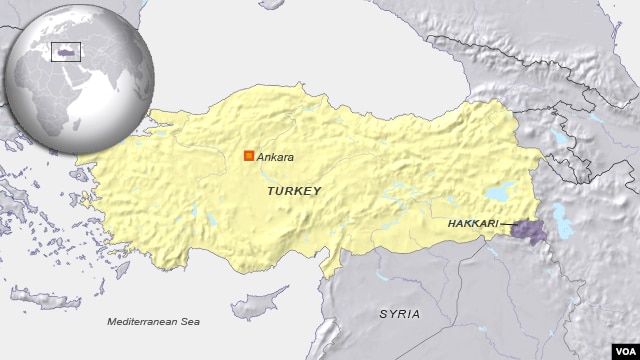
Turkish aircraft pounded Kurdish rebel bases in Turkey on Tuesday for the first time since a peace process began almost two years ago. The attacks follow major unrest across Turkey's predominantly Kurdish southeast over what Kurds see as Ankara's inaction while the Syrian Kurdish city of Kobani is under siege by the Islamic State militant group.
The air attacks against the Kurdistan Workers Party, the PKK, are reported to have occurred in Hakkari province on Iraq’s border.
...The air strikes follow last week’s violent protests by Kurds throughout Turkey over the government’s refusal to allow military assistance for Syrian Kurds under siege by the Islamic State in the city of Kobani on Turkey’s border.
At least 35 people were killed in riots last week when members of Turkey's 15 million-strong Kurdish minority rose up in anger at the government for refusing to help defend the Syrian border town of Kobani from an assault by Islamic State militants.
International relations expert Soli Ozel of Istanbul’s Kadir Has University says the Turkish air strikes are part of a wider power struggle between Ankara and Turkey’s Kurdish movement.
"That was the response, to a certain extent, to last week’s riots. That corresponds to what the prime minister said today [Tuesday] -- that they will respond disproportionately to vandalism, to terrorist activities and violence and all that," said Ozel. "And that they in their minds make a distinction, between the peace process which they believe is not defunct and those who try to force Turkey’s hand, by threat or use of violence."
Since March 2013, the PKK has largely observed a cease-fire with the Turkish state as part of a peace process with the Turkish government. The process seeks to end a three decade conflict by the PKK for greater Kurdish minority rights.
But PKK military leaders based in neighboring Iraqi Kurdistan have linked the fate of the peace process to the fate of Kobani.
Kadri Gursel, an expert on the conflict and diplomatic columnist for the Turkish newspaper Milliyet, warns that Kurdish anger over Kobani is part of a wider disillusionment with the peace process.
"For more than two years nothing," said Gursel. "No concrete step has been taken by the government to advance the so-called peace and solution process. And also there is this Kobani and Rojava situation. There is anger - a growing anger among Kurds."
Observers point out that anger among Turkey’s large Kurdish minority is also growing over reports Ankara is refusing to allow the delivery through its territory of a shipment of arms from Iraqi Kurds to Kurds besieged in Kobani. Syrian fighters have repeatedly said they are in urgent need of military supplies.
There are growing calls internationally for Turkey to open its border to allow military supplies of Kobani. But, Ankara accuses the Syrian Kurds of being terrorists linked to the PKK and has ruled out any delivery of military supplies.
Analyst Ozel warns the government is paying an increasingly high diplomatic price for its stance.
"[They are] pretty isolated but it's also a country that the world system cannot afford to isolate totally," said Ozel. "It's obviously putting itself in a position where it does not have too many friends."
But Ankara’s stance appears to be hardening along with air strikes against the PKK. Turkish President Recep Tayyip Erdogan called for similar action to be taken against both the Islamic State group and the Syrian Kurdish fighters, claiming both are terrorist organizations and that Turkey has no interest in the fate of Kobani.
Political observers warn that is likely to only further alienate Turkey's Western allies as well as its large Kurdish minority.

No comments:
Post a Comment